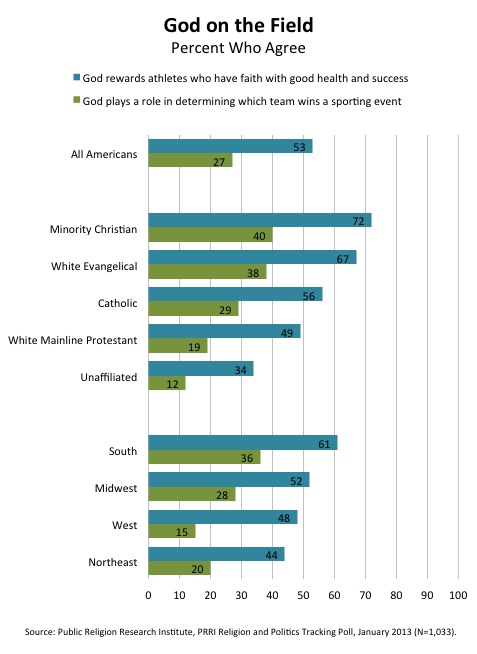Nearly 3-in-10 Americans Say God Plays a Role in Outcomes of Sports Events
I. Who's Watching the Super Bowl
Less than a week before Super Bowl XLVII, nearly two-thirds of Americans say they are very (44%) or somewhat (22%) likely to watch the game this year. There are few divisions on this question by religious affiliation, age, or political affiliation; however, there are significant differences by race and gender.
Black (78%) and white (69%) Americans are substantially more likely than Hispanic Americans (52%) to say they are somewhat or very likely to watch the Super Bowl this year.
Although solid majorities of both genders report that they are somewhat or very likely to watch the Super Bowl this year, men (73%) are more likely than women (58%) to say they are likely to watch the game.
Two percent of Americans report that the team they identify with most closely is the San Francisco 49ers, while one percent say the same of the Baltimore Ravens.
More than 4-in-10 (42%) Americans who seldom or never watch sports nevertheless report that they are very or somewhat likely to watch the Super Bowl this year.
Professional football is, by far, Americans’ most-watched or followed sport: nearly half (48%) of Americans who watch college or professional sports at least a few times a year say professional football is the sport they follow most closely, while around 1-in-10 say the same of college football (12%) or professional basketball (11%). Less than 1-in-10 report that they follow major league baseball (7%) or college basketball (6%) most closely.
Most Americans (55%) say that football has replaced baseball as America’s national sport, while more than one-third (36%) disagree.
II. God on the Field
 Americans are less likely to believe that God plays a role in the outcome of sporting events than they are to believe God rewards religious athletes. While only about 3-in-10 (27%) Americans, believe that God plays a role in determining which team wins a sporting event, a majority (53%) believe that God rewards athletes who have faith with good health and success, compared to 42% who disagree. There are substantial differences by religious affiliation on all of these questions.
Americans are less likely to believe that God plays a role in the outcome of sporting events than they are to believe God rewards religious athletes. While only about 3-in-10 (27%) Americans, believe that God plays a role in determining which team wins a sporting event, a majority (53%) believe that God rewards athletes who have faith with good health and success, compared to 42% who disagree. There are substantial differences by religious affiliation on all of these questions.
Majorities of all religious groups disagree that God plays a role in determining which team wins a sporting event, but there are differences in intensity. Roughly 4-in-10 minority Christians (40%) and white evangelical Protestants (38%) agree that God does play a role in the outcome of a sporting event, compared to less than 3-in-10 (29%) Catholics, less than 1-in-5 (19%) white mainline Protestants, and approximately 1-in-10 (12%) religiously unaffiliated Americans.
More than one-third (36%) of Americans who live in the South agree that God plays a role in determining which team wins a sporting event, compared to nearly 3-in-10 (28%) Americans who live in the Midwest, 1-in-5 (20%) Americans who live in the Northeast, and 15% of Americans who live in the West.
Republicans (25%) are, however, equally as likely as Democrats (28%) and independents (26%) to agree that God plays a role in determining which team wins a sporting event.
More than 7-in-10 (72%) minority Christians and two-thirds (67%) of white evangelical Protestants agree that God rewards athletes who have faith with good health and success, as do a majority (56%) of Catholics. White mainline Protestants are divided (49% agree, 48% disagree). More than 6-in-10 (62%) religiously unaffiliated Americans disagree, saying that God does not reward athletes who have faith with good health and success. However, more than one-third (34%) of religiously unaffiliated Americans agree that God rewards religious athletes.
Half (50%) of Americans approve of athletes expressing their faith publicly by thanking God during or after a sporting event, compared to only 4% who disapprove. Nearly half (45%) say it does not matter.
White evangelical Protestants (77%) and minority Christians (60%) are more likely than white mainline Protestants (47%) and Catholics (46%) to approve of athletes who express their faith publicly at sporting events. Only 27% of religiously unaffiliated Americans say they approve of athletes who express their faith publicly at sporting events, but only 8% say they disapprove; 64% say it does not matter.
Republicans (67%) are more likely than Democrats (45%) and independents (43%) to say they approve of athletes who express their faith publicly at sporting events. Slim majorities of Democrats (51%) and independents (52%) say this does not matter, compared to 3-in-10 (30%) Republicans.
Americans who live in the South (60%) are more likely than Americans who live in the Midwest (50%), West (44%), or Northeast (39%) to say they approve of approve of athletes who express their faith publicly at sporting events.
III. Weekend Priorities: Football vs. Church
More than one-quarter (26%) of Americans say that on any given Sunday, they are more likely to be in church, while nearly 1-in-5 (17%) say that they are more likely to be watching football. Nearly 4-in-10 (36%) say they are more likely doing neither, while approximately 1-in-5 (21%) say they are more likely to be doing both.
Women (32%) are more likely than men (19%) to report that on any given Sunday, they are more likely to be in church. Meanwhile, men (22%) are more likely than women (13%) to say they are more likely to be watching football. Women are about equally as likely as men to say that they are more likely to be doing both (19% vs. 23%) or doing neither (36% vs. 35%).
Republicans (37%) are more likely than independents (26%) or Democrats (18%) to say that on any given Sunday, they are more likely to be in church. However, Republicans (16%), Democrats (19%), and independents (16%) are about equally as likely to say that they are more likely to be watching football. Democrats (40%) and independents (40%) are twice as likely as Republicans (20%) to say they are more likely to be doing neither, while 27% of Republicans, 23% of Democrats, and 18% of independents say they are more likely to be doing both.
Not surprisingly, behavior varies significantly by religious affiliation. Nearly half (46%) of white evangelical Protestants report that they are more likely to be at church on any given Sunday, while less than 1-in-10 (7%) say they are more likely to be watching football. White mainline Protestants, by contrast, are nearly equally as likely to say they would be watching football (21%) as to say they would be at church (19%).
Nearly 4-in-10 (38%) Hispanic Americans say that on any given Sunday, they are more likely to be in church, compared to approximately 1-in-5 white (23%) and black (22%) Americans.
Americans say religion is significantly more important to their lives than their fan affiliation, but they are about as likely to watch sports each week as they are to attend religious services.
More than 6-in-10 (62%) Americans say they consider themselves a fan of a particular sports team. However, among these self-identified sports fans, less than 1-in-5 report that being a fan of their favorite team is the most important thing (1%) or a very important thing (14%) in their lives. Roughly 4-in-10 (42%) say that being a fan of is somewhat important, while more than 4-in-10 (43%) say it is not too important or not at all important.
By contrast, 58% of Americans say that religion is the most or a very important thing in their life, nearly one-quarter (23%) say it is somewhat important, and only 18% say it is not too important or not at all important.
However, when it comes to watching sports, Americans are just as likely to say they watch sports at least once a week as they are to say they attend church or another place of worship. More than 4-in-10 Americans say they watch college or professional sports more than once a week (22%) or once a week (19%). Similarly, nearly 4-in-10 (37%) Americans say they attend a church or place of worship at least once a week.
More than three-quarters (76%) of Americans agree that public high schools should be allowed to sponsor prayer before football games. There are few differences by race, region, gender, or age.
More than 9-in-10 (93%) white evangelical Protestants, approximately 8-in-10 white mainline Protestants (82%), minority Christians (81%), and Catholics (79%), and even a majority (56%) of religiously unaffiliated Americans agree that public high schools should be able to sponsor prayer before football games.
Nearly 9-in-10 (89%) Republicans agree that public high schools should be allowed to sponsor prayer before football games, compared to more than three-quarters (77%) of independents and nearly 7-in-10 (68%) Democrats.
Recommended citation:
Jones, Robert P., Daniel Cox, and Juhem Navarro-Rivera. “Nearly 3-in-10 Americans Say God Plays a Role in Outcomes of Sports Events.” PRRI. 2013. http://www.prri.org/research/january-2013-tracking-poll-2/.





